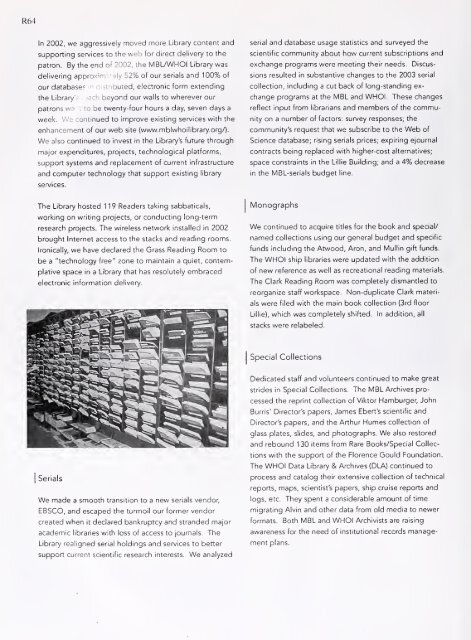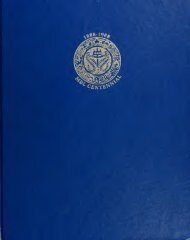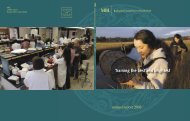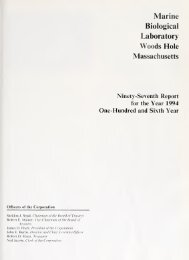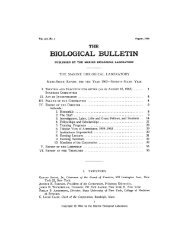View/Open - HPS Repository - Arizona State University
View/Open - HPS Repository - Arizona State University
View/Open - HPS Repository - Arizona State University
Create successful ePaper yourself
Turn your PDF publications into a flip-book with our unique Google optimized e-Paper software.
) be<br />
outed,<br />
R64<br />
In 2002, we aggressively moved more Library content and<br />
supporting services to the web for direct delivery to the<br />
patron.<br />
By the end of 2002, the MBL/WHOI Library was<br />
delivering appro-r -ly 52% of our serials and 100% of<br />
our database?<br />
'<br />
electronic form extending<br />
the Library'<br />
;rh beyond our walls to wherever our<br />
patrons " -<br />
twenty-four hours a day, seven days a<br />
week. We continued to improve existing services with the<br />
enhancement of our web site (www.mblwhoilibrary.org/).<br />
We also continued to invest in the Library's future through<br />
major expenditures, projects, technological platforms,<br />
support systems and replacement of current infrastructure<br />
and computer technology that support existing library<br />
services.<br />
serial and database usage statistics and surveyed the<br />
scientific community about how current subscriptions and<br />
exchange programs were meeting their needs. Discussions<br />
resulted in substantive changes to the 2003 serial<br />
collection, including a cut back of long-standing exchange<br />
programs at the MBL and WHOL These changes<br />
reflect input<br />
from librarians and members of the community<br />
on a number of factors: survey responses; the<br />
community's request<br />
that we subscribe to the Web of<br />
Science database; rising serials prices; expiring ejournal<br />
contracts being replaced with higher-cost alternatives;<br />
space constraints in the Lillie Building;<br />
in the MBL-serials budget line.<br />
and a 4% decrease<br />
The Library hosted 1 1 9 Readers taking sabbaticals,<br />
working on writing projects, or conducting long-term<br />
research projects. The wireless network installed in 2002<br />
brought Internet access to the stacks and reading rooms.<br />
Ironically, we have declared the Grass Reading Room to<br />
be a "technology free" zone to maintain a quiet, contemplative<br />
space in a Library that has resolutely embraced<br />
electronic information delivery.<br />
Monographs<br />
We continued to acquire titles for the book and special/<br />
named collections using our general budget and specific<br />
funds including the Atwood, Aron, and Mullin gift funds.<br />
The WHOI ship libraries were updated with the addition<br />
of new reference as well as recreational reading materials.<br />
The Clark Reading Room was completely dismantled to<br />
reorganize staff workspace.<br />
Non-duplicate Clark materials<br />
were filed with the mam book collection (3rd floor<br />
Lillie), which was completely shifted. In addition, all<br />
stacks were relabeled.<br />
Special Collections<br />
Dedicated staff and volunteers continued to make great<br />
Serials<br />
|<br />
We made a smooth transition to a new serials vendor,<br />
EBSCO, and escaped the turmoil our former vendor<br />
created when it declared bankruptcy and stranded major<br />
academic libraries with loss of access to journals. The<br />
Library realigned serial holdings and services to better<br />
support current scientific research interests. We analyzed<br />
strides in Special Collections. The MBL Archives processed<br />
the reprint collection of Viktor Hamburger, John<br />
Burris' Director's papers,<br />
Director's papers,<br />
James Ebert's scientific and<br />
and the Arthur Humes collection of<br />
glass plates, slides, and photographs. We also restored<br />
and rebound 130 items from Rare Books/Special Collections<br />
with the support of the Florence Gould Foundation.<br />
The WHOI Data Library & Archives (DLA) continued to<br />
process and catalog their extensive collection of technical<br />
reports, maps, scientist's papers, ship cruise reports and<br />
logs, etc. They spent a considerable amount of time<br />
migrating Alvm and other data from old media to newer<br />
formats.<br />
Both MBL and WHOI Archivists are raising<br />
awareness for the need of institutional records management<br />
plans.


